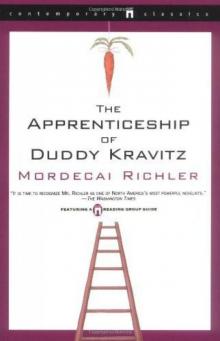- Home
- Mordecai Richler
A Choice of Enemies Page 18
A Choice of Enemies Read online
Page 18
“May I buy you a drink?”
She told him her name was Vivian.
“I don’t know what my name is,” he said. “I’ve lost my memory.”
II
Karp came into their room, sat down, and took an apple out of his pocket. His face was puffed. “I’ve just been to Norman’s room,” he said. “Something is wrong.”
Ernst rose. Sally, who had been washing her hair, wrapped a red towel round her head like a turban and pulled it tight. She was wearing a pink slip. “Are you sure?” she asked.
“All the papers he usually carries with him are spread out over his desk.”
“I don’t understand.”
“He didn’t show up for his appointment with Winkleman this afternoon,” Karp said. “That’s not like Norman.”
“Have you told him about Ernst?”
Karp rubbed his apple against his jacket until it shone. “How was one to know that you would not run away?” he asked.
“Thank you for being so helpful.” Sally pulled the towel tighter round her head. “What do you think has happened to Norman?”
“One cannot be sure. But his memory has failed him before.” Karp bit tentatively into his apple, as though he expected to find a worm there. “But don’t hope for too much. It is certainly very temporary.”
“We must find him,” Ernst said.
“Yes,” Sally said weakly, “of course.”
“Perhaps we should send for the police,” Karp suggested.
“Aren’t we being just a little bit hysterical?” Sally asked. “Norman left all his things on his desk and didn’t turn up for an appointment. So what?”
Karp bit into his apple savagely; he smiled knowingly at Ernst. “She has changed,” he said. “She has come under your influence.”
“We will not send for the police,” Ernst said. “If Norman has no memory we will find him ourselves.”
“How?”
“I still think you’re taking a lot for granted,” Sally said. “For all we know Norman is drunk somewhere. He’s probably perfectly all right.”
“If one were to find Norman,” Karp began, “if Ernst, for example were to find Norman in his present state and was able to convince him that he was indeed somebody other than Norman Price. That would be interesting, wouldn’t it?”
Karp dropped his apple into a wastepaper basket, wiped his fingers with an initialled handkerchief, and left.
Ernst slouched thoughtfully silent on the bed. If he could find Norman, he thought, and help him, if he could be the one to restore him to his friends, then Norman would be obligated to him. He might even have to forgive – He told Sally of his idea.
Sally, remembering the results of Ernst’s last “good turn” – the episode of the stolen wallet – was struck stupid with horror.
“Anyway,” she said, “there’s probably nothing to it. Norman’s out on a binge; that’s all.”
III
It was three a.m., or nearly that, when Vivian noticed that he was sitting up in bed.
“It’s here,” Norman said. “It’s in the room.”
“What?” she asked, hardly awake.
“I can feel it in the room.”
“Don’t look at me like that.”
“Turn on the lights,” he said.
There were twin beds in the room. Three of the walls were painted yellow. A North African rug was tacked up against the other wall. Vivian owed three more payments on the Swedish lamp. The bureau, rescued from a Camden Town junk shop, had been scraped and painted flat black. The wardrobe came from the same shop.
Vivian leaped out of bed. “There,” she said, turning on the lights. “Feel better?”
“Open up the cupboard door.”
I never should have brought him here, she thought.
But he had seemed so troubled in the pub, and once he had told her his story there had been no decent alternative.
The basement flat on Oakley Street consisted of an immense living room, a double bedroom which she shared with her cousin Kate – Kate was off for a fortnight’s holiday in Juan les Pins with Binky Thomas and the Hillarys – and a kitchen. She and Kate shared the toilet with Roger and Polly Nash upstairs. Roger had papered the toilet walls with New Yorker cartoons. He was not a bad sort.
“Open up the cupboard door, please.”
“You’re frightening me,” Vivian said.
“Open – the – cupboard – door.”
She did as he had asked.
“You’re a grown man. What’s here? What’s hiding in the wardrobe?”
“I don’t know.”
He stared; he said nothing more.
“It’s chilly,” she said. “I’m cold standing here like this.”
She was also embarrassed. All she was wearing was one of Kate’s diaphanous blue negligées. The lights were on, too.
“I’m afraid.” Norman held his hands to his temples and then dropped them to the blankets as though he was done with them forever. “I’m so afraid.”
“Afraid of what? First you go on and on about a child’s balloon and then you wake up in the middle of the night and –”
“Have you a flashlight here? A torch, I mean.”
She got the flashlight out of the bureau drawer and handed it to him. His fingers were cold, clammy.
“It’s here.” He shone the light into the wardrobe. “I’m sure it’s in the room.”
“What’s in the room?”
“Move the clothes about. Shake them.”
“I won’t do it.” Whimpering softly, she began to prod the clothes with a hanger. But from a distance. “I’ve never heard of anything so silly.”
Next he shone the flashlight under the bed.
“Stop that. Please stop.”
Norman sat up on the edge of the bed and held his head in his hands.
Vivian stripped her own bed of a pillow and two blankets. “You ought to see a psychiatrist,” she said. “Other people have gone through worse, I dare say, and they’re not –”
“Crazy?”
“Don’t put words into my mouth.”
He began probing the room with the flashlight again.
“What could a psychiatrist do? It’s here, here in the room.”
“I’ve never heard such –”
“You’ve got a blanket,” he said. “You’re going.”
“I’m going to sleep on the couch in the living room. That’s what I should have done in the first place, but.…”
“But what?”
“… I didn’t want you to think that I was afraid.”
“Admit it then,” Norman said. “Admit you feel it too.”
“Feel what?”
“Scared.”
“Of course I’m scared,” she said, relieved. “You’re scaring me.”
“It’s here. Here in the room.”
“I refuse to discuss it any more.”
“Why did you wake then,” he asked. “What made you wake?”
A shiver ran through her. “You see,” he said.
“I don’t see. But if you like,” she said, “I’ll stay. I’ll sit up with you.”
He had forgotten about her. He was exploring the room with his flashlight again. So Vivian went into the other room.
Norman examined one corner of the room intently. Satisfied that there was nothing there he sat down on the floor in the corner with his back to the wall, where it couldn’t get behind him. Then, pulling his knees up, he began to go over the room with his flashlight, over and over again, until he fell asleep. He woke shortly after seven in the morning because of the sun. The sun shone into his eyes. Vivian woke when he came into the living room.
“Feeling better?” she asked.
Her cheeks marked from the pillow, her black hair stuck to her forehead, Vivian flung back her blankets drowsily. Her brown back made a delightful curve as she brought her knees up to her chin, hugged them, and smiled. She had very small breasts. Her legs were a bit heavy and her ankles were
thick.
“Yes,” Norman said. “I feel fine.”
Vivian rose, embarrassed, and slipped hastily into her dressing gown. “I’ll make you breakfast,” she said.
“I haven’t got time,” Norman said evasively.
“What’s your hurry?”
“I have to go to Waterloo Air Terminal.”
“The balloon?”
“Yes,” he said.
Again he was the severe, greying, troubled man who had picked her up in the pub. Vivian smiled sadly, concerned. “Is it that important?”
“I have to find out if it’s still up there.”
“And if it isn’t?”
“What do you mean,” he said angrily. “How could they get it down?”
“Look,” Vivian said in her most reasonable tone of voice, “you’re not well. Why don’t you stay here with me for a bit? I could ring the office to tell them I’m not coming in today and –”
“I must get to Waterloo.”
“All right,” she said, “but you’re going to have breakfast first.”
Norman reluctantly agreed to stay for breakfast.
While he went into the bathroom to shave – she told him that he could use Binky’s shaving equipment – Vivian prepared breakfast.
Looking out of the kitchen window Vivian saw a taxi pull up in front of the house. Kate stepped out, dipping one lovely leg first and then a thoughtful pause, like a child trying the water, before she risked the other one. Kate was a model. A tall, healthy blonde, with quick blue eyes. Lugging her bag across to the bedroom, she took the situation in swiftly. A man’s jacket had been tossed clumsily over the Windsor chair. There were two glasses and an open bottle of gin on the coffee table.
“Come into the kitchen with me,” Vivian said urgently.
Kate kissed Vivian on the forehead. “It’s perfectly all right,” she said. “All I hope is that he’s nice.”
“But you don’t understand –”
“Mind you don’t burn his bacon,” Kate said. “That would be a bad start.”
Kate was wearing a cloche hat, a thick, extravagantly striped turtleneck sweater and a mustard yellow skirt that was very tight around her hips. She propped herself up on the kitchen table, swung her legs out and inspected them dispassionately, like she was seeing them in a nylon ad.
Vivian felt wrinkled and very much in need of a bath after a largely sleepless night. “How come you’re back so soon,” she said.
“The trip turned out to be an absolute horror,” Kate began. “The Hillarys began to fight the moment we crossed the Channel. Barbara went on and on about Dickie’s drinking and Dickie saw black every time a wog smiled at her. Once we got to Juan les Pins Dickie was hardly ever sober. He took Binky out on the town every night and Barbara and I were left to fend for ourselves. Well, I didn’t mind that. There was the sweetest little Indian at our pension. The son of a maharaja or pasha or whatever it is they’re called. Anyway the night before last Binky burst into my room madly drunk at three a.m. and asked me to lend him ten quid. That was the first time I’d seen him in two whole days, mind you. I lost my temper. One thing led to another and I gave him back my ring. What a kerfuffle!” Kate’s bosom swelled indignantly. “The marriage is off. I’m quite relieved, actually. Have you ever met Binky’s mother?”
“No, I –”
“She thinks I’m fast because we all went to Davos together last Christmas. I’m through with the Hillarys too. Dickie’s a frightful bore, actually. If Barbara had any sense she’d leave him. What’s your young man like?”
“He’s an American.”
“I say, he’s not one of those airmen, is he?”
“No, Kate. He isn’t.”
“I’ve got the cafard,” Kate said glumly.
Vivian told her that she had met Norman at the Lord Nelson. He was suffering from amnesia, and had no place to go, so she had brought him home. They had slept in separate beds.
“Please, darling, you don’t have to tell me a story. I’ll pop upstairs and have tea with Roger and Polly. We can chat after he’s gone.”
As Kate started up the stairs Norman came out of the toilet in his shorts. “Oh,” Kate said, “you gave me a fright. I’m Vivian’s cousin.” She hurried past him to the Nashes’ flat.
Roger and Polly Nash were eating breakfast. The kitchen smelled of bacon and drying nappies.
“Kate,” Roger said, “I thought I recognized your hard shrewish voice.” He cleared a chair of towels and poured her a cup of tea. “I say, has Horse-Face actually got a man down there?”
Polly saw that Kate was annoyed. “Roger,” she said. “Stop that.”
Polly had been a little frightened of Kate ever since Kate had caught her out mistaking a bidet for a foot-bath when she had been telling John and Edith Laughton about her trip to the Midi.
Kate told them the story Vivian had told her.
“If she’s going to have a thing with this chap,” Roger said, “maybe you’ll be able to have the flat for yourself again.”
Being on her own again, she thought, would be nice. “I just happen to like sharing the flat with Vivian,” she said.
“Certainly,” Polly said. “I’m frightfully fond of her myself.”
“Balls,” Roger said. “You’re afraid of losing a baby-sitter.” He smiled thinly at Kate. “I think it’s been jolly good of you to put up with Vivian for so long, but –”
“I like sharing the flat with Vivian.”
Roger grinned. “What’s the chap like?” he asked. “No. Don’t tell me. He’s a graduate of the London School of Economics, he works for the coal board. He’s from Manchester, he is. Calls poor Vivian ducks and once came first in a weekend competition in the Staggers & Naggers.”
Polly giggled.
“He’s an American,” Kate said.
“I say, she is a fallen woman now, isn’t she?”
“He’s not an airman.”
Vivian served Norman another cup of coffee.
“I must get to Waterloo,” Norman said.
“Wait till I get dressed and I’ll go with you.”
Norman looked dismayed.
“Is there anything wrong with that?” she asked.
“Why do you want to come with me?”
“I’d like to help you.”
“I don’t know who I am,” he said shyly. “I’ve lost my memory.”
“I know,” she said. “You told me last night.”
“Why are you so anxious to help me?” he asked.
“You’re in trouble. Somebody’s got to help you. Wait,” she said, getting up hastily. “I’m going to make more coffee. I’ll only be a minute.”
But Vivian had not been in the kitchen very long before she heard the front door click.
Roger and Polly and Kate rushed to the window just in time to see Norman turn the corner hastily. Only a few seconds later Vivian appeared on the pavement in her dressing gown. Kate pulled Roger and Polly back from the window.
“I’m warning you,” Kate said. “You’re not to say a word to her. You’re not to say a word to anyone about this.”
Kate found Vivian in the bedroom. Her cousin was dressing hastily.
“Where are you going?”
“Waterloo Air Terminal,” Vivian said.
“But, darling, you mustn’t chase him. This will never do.”
“He’s sick,” Vivian shouted impatiently. “He doesn’t know who he is.”
“You can’t go out like this. You haven’t any make-up on. Oh, look at your hair, Vivian.”
Vivian laughed hysterically. “Get out of my way,” she said.
“Wait. I’ll go with you.”
“You certainly will not.”
IV
“What’s this,” Ernst asked, as he entered the room. “I don’t understand.”
“I’ve packed all our bags.”
“Where are we going?”
“Anywhere,” Sally said acidly. “I don’t care.”
Erns
t sat down on the bed. He was exhausted. “There was nobody home at the Lawsons’,” he said, “but I’ve been almost everywhere else. Nobody has seen Norman.”
“Ernst. Look at me, Ernst.”
He lifted his head heavily. Sally was thinner, there were circles under her eyes, and a kind of fright, something altogether new, in her manner. She no longer curled up sleepily satisfied in the easy chair; she sat stiffly on the edge.
“Yes,” he said.
“Do you love me?”
She noticed yet again how bony he was, how much like a fox. She would have liked to hit him.
“What’s wrong, Sally?”
“I asked you a question.”
“Of course I love you.”
“I’ve had enough, Ernst. Every time that door opens I think they’ve come to take you away from me. Now you listen to me. I’ve taken all my money out of the bank. I’ve got enough to last us for a while. I want you to come away with me this afternoon.”
“No. I can’t.”
“Why?”
“That’s just what Karp is waiting for me to do,” he shouted.
“Karp? Don’t tell me you’re worried about him.”
“I said no.”
“You said. You said.”
“And Norman. There’s Norman too. He was a big help to us.”
“Aren’t you the moral one suddenly?”
“Yes,” he said, “suddenly.”
“Would you rather hang?”
“I’m not going to run away,” he said.
Sally sat down, suppressing nausea. “Tell me why?” she said.
“I already told you.”
“Tell me again.”
“Oh, leave me alone. How do I know why? I can’t, that’s all. Norman is the first friend I ever had. He – stop trying to make a fool out of me!”
“You owe it to me to run away.”
“No.”
“I hate you,” she cried passionately. “Oh, I hate you. I hate you and Europe and I hate Karp. I think you’re sordid. I wish I’d never met you.” Sally began to weep. He went to her and she hugged him very tight and said, “Let’s run away. Please, please, darling, let’s run away. I don’t want to see you killed. I love you.”
“I can’t,” he said. “They – all of them think I’m rotten. I’m after your passport, I’m a Nazi or – If I was Norman or Landis I could run away,” he said. “People would be understanding. But I’m Ernst Haupt, so I can’t.” He laughed bitterly. “It’s like.… It’s almost like I was a Jew myself and had to take care. I – I can’t run away. I’m trapped.”

 Dispatches From the Sporting Life
Dispatches From the Sporting Life The Acrobats
The Acrobats Son of a Smaller Hero
Son of a Smaller Hero Jacob Two-Two-'S First Spy Case
Jacob Two-Two-'S First Spy Case Jacob Two-Two Meets the Hooded Fang
Jacob Two-Two Meets the Hooded Fang Jacob Two-Two and the Dinosaur
Jacob Two-Two and the Dinosaur Joshua Then and Now
Joshua Then and Now Solomon Gursky Was Here
Solomon Gursky Was Here Cocksure
Cocksure The Street
The Street The Apprenticeship of Duddy Kravitz
The Apprenticeship of Duddy Kravitz A Choice of Enemies
A Choice of Enemies Barney's Version (Movie Tie-In Edition)
Barney's Version (Movie Tie-In Edition) St. Urbain's Horseman
St. Urbain's Horseman The Incomparable Atuk
The Incomparable Atuk Barney's Version
Barney's Version